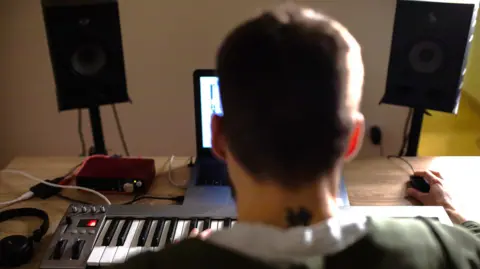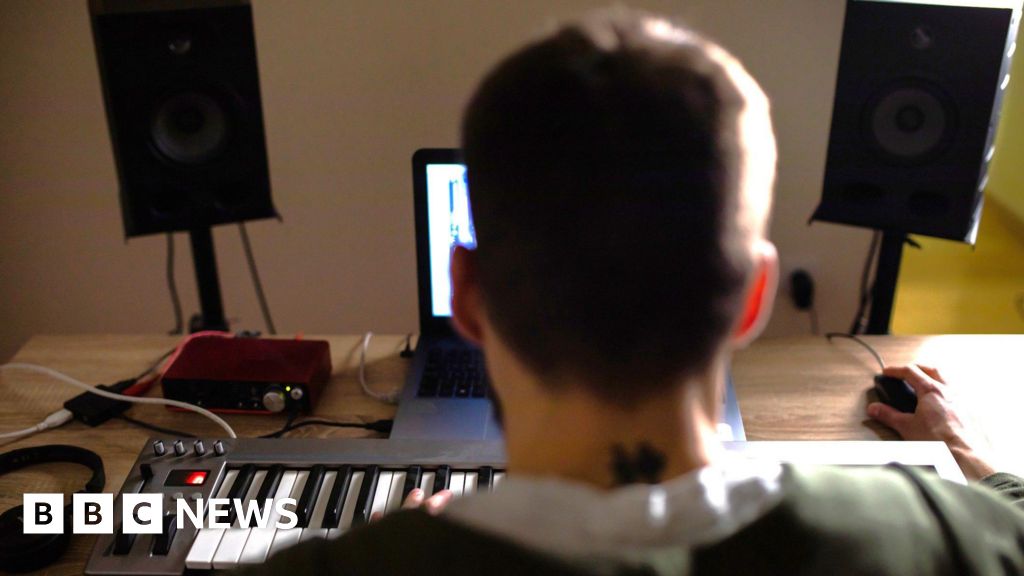 Getty Images
Getty ImagesA musician in the US is accused of using artificial intelligence (AI) tools and thousands of bots to fraudulently stream songs billions of times in order to claim millions in royalties.
Michael Smith of North Carolina was charged with three counts of wire fraud, conspiracy to commit wire fraud, and conspiracy to commit money laundering.
The public prosecutor’s office stated that this was the first criminal case of this kind that it had heard.
“Through his brazen fraud scheme, Smith stole millions in royalties that should have been paid to musicians, songwriters and other rights holders whose songs were legally streamed,” said U.S. Attorney Damian Williams.
According to an open indictment detailing the allegations, the 52-year-old used hundreds of thousands of AI-generated songs to manipulate streams.
To avoid detection, the tracks were streamed billions of times across multiple platforms by thousands of automated bot accounts.
According to authorities, Mr. Smith demanded more than $10 million in royalties over the course of the multi-year fraud.
Prosecutors said Mr Smith must finally face the consequences following an investigation involving the FBI.
“The FBI remains committed to tracking down those who manipulate advanced technology to generate ill-gotten gains and compromise the genuine artistic talent of others,” said FBI Acting Assistant Director Christie M. Curtis.
“Instant music ;)”
According to the AccusationAt one point, Mr. Smith operated as many as 10,000 active bot accounts to stream his AI-generated tracks.
It is alleged that the tracks in question were provided to Mr Smith as part of a partnership with the managing director of an unnamed AI music company, whom he approached in around 2018.
The co-conspirator is said to have supplied him with thousands of tracks per month in exchange for metadata of the tracks, such as song and artist names, as well as a monthly share of the streaming revenue.
“Remember what we do here musically… this is not ‘music’, it’s ‘instant music’ ;),” the manager wrote in an email to Mr Smith in March 2019, which was disclosed in the indictment.
Citing additional emails from Mr Smith and other participants in the plot, the indictment also says that the technology used to create the tracks has improved over time – making the plot harder for platforms to detect.
In a February email, Mr Smith claimed that his “existing music has generated over 4 billion streams and $12 million in royalties since 2019 at this time.”
If found guilty of the charges, Mr Smith faces several decades in prison.
Earlier this year, a man in Denmark was reportedly sentenced to 18 months in prison after being found guilty Fraudulent profiting from royalties for music streaming.
Music streaming platforms such as Spotify, Apple Music and YouTube generally prohibit their users from artificially inflating the number of their streams to receive royalties. They have taken measures to combat this practice or provide advice to their users on how to avoid it.
Under Changes to royalty policy Spotify announced that it would charge labels and distributors per track if it detects artificial streams of their material.
It also increased the number of streams a title needs in a 12-month period before royalties can be paid, and extended the minimum title length for sound recordings, such as white noise tracks.
Major concerns
The increasing rise of AI-generated music and the increasing availability of free track creation tools have increased concerns among artists and record labels about whether they are receiving their fair share of the profits generated from AI-generated tracks.
Tools that can create text, images, videos and audio files in response to prompts are based on systems that have been “trained” on huge amounts of data, such as online text and images, often randomly collected from across the Internet.
Content owned by artists or copyrighted by third parties has been filtered out and now forms part of the training data for such tools.
This has caused outrage among artists across all creative industries, who feel that their work is being exploited to create seemingly novel material without receiving due recognition or reward.
Platforms rushed to remove a track that clones the voices of Drake and The Weeknd in 2023 after it went viral and found its way onto streaming services.
Earlier this year, artists such as Billie Eilish, Chappell Roan, Elvis Costello and Aerosmith signed an open letter calls for an end to the “predatory” use of AI in the music industry.


